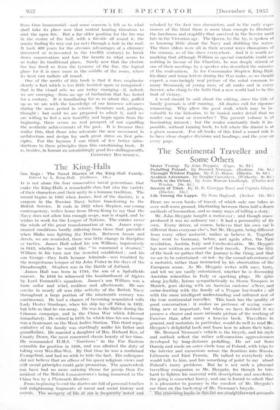The King-Halls
yea Saga : The Naval Diaries of the King-Ball Family. Edited by L. King-Hall. (Gollancz. I8s.)
Ir is not alone the four consecutive naval generations that make the King-Halls a remarkable elan, but also the variety of their characters and their unity in a humane tradition. The record begins in 1805 when James, first of the diarists, is a surgeon in the Russian Navy before transferring to the British Service. It ends in 1922 when Stephen, our young contemporary, writes home from Hong-Kong to say that the Navy does not allow him enough scope, war is stupid, and be wishes to work for the League of Nations. The entries cover the whole of the great transformation at sea. James expe- rienced conditions hardly differing from those that prevailed When Blake was fighting the Dutch. Between Anson and Jervis, we arc reminded, there was little change in discipline or tactics. James Hall asked his son William, impressively in 1842, whether he would like " to command a steamer." William in his turn saw the ironclad established ; and his son George—they both became Admirals—was troubled by the tempestuous temper of Sir John Fisher in the days of the Dreadnought. Stephen was in the Battle of Jutland. James Hall was born in 1784, the son of a Spitalfields -weaver. In 1818 he witnessed the bombardment of Algiers by Lord Exmouth's squadron. James's son William was a born sailor and rebel, reckless and affectionate. He saw service in nearly all seas (the activity of the British Navy throughout .a large portion of the nineteenth century was continuous). He had a chance of becoming acquainted with Lady Hester Stanhope, when his ship lay off Sidon in 1832, but tells us that lie ran away. He was in the Baltic during the Crimean campaign, and in the China War which followed immediately. He retired 41870, by which time his son George was a lieutenant on the West Indies Station. This third repre- sentative of the family was startlingly unlike his father and grandfather. He married a daughter of Mrs. Richard Ker, of County Down, the most renowned classic beauty of her time. He commanded H.M.S. ' Narcissus in the Far Eastern scramble for position in 1898, and was allotted the duty of taking over Wei-Hai-Wei. By that time he was a confirmed Evangelical, and had no wish to hide the His colleagues did not believe that an officer of his queer religions views and stiff moral principles could gain promo tioi • The quarterdeck can have had no more enticing theme for gossip than the incident of the British Commissioner's being immersed in the China Sea by a Plymouth Brother, From beginning la, end the diaries arc full of personal touches filid enlightening fragments of naval and social history and morals. The savagery of life at sea is frequently noted and rebuked by• the first two chroniclers, and in the early expe- riences of the third there is more than enough to illustrate the harshness and stupidity that survived in the Service until late in the Victorian age. The Queen, by the by, is spoken of as knowing little about the Navy and disliking the water. The three elders were all in their several ways champions of the seaman, as of the slave everywhere. And it is worth re- marking that although William as special constable could See nothing in favour of the Chartists, he was deeply stirred at one of their meetings by a speaker who described the miseries of the. coal-miners. As for. Commander Stephen Xing-Hall, his diary and home letters during the War make, as we should expect,•a convincingly real -picture of the mind conimon to many thousands, of young men,' of all. ranks and in every Service, who cluiig to the faith that a new world had to be the fruit of victory. • A word -should be said about the editing, since the tide of family' journals' is 'still running. All diaries call for rigorOus winnowing. Why allow the good stuff, which may be in- valuable to the historian, to be buried under detail that !no reader can *ant or remember ? The present volume is id -fascinating interest ; but the reader constantly finds it im- possible, without turning back, to tell where the diarist is at a given moment. For all books of this kind a sound ride is to have clear chapter divisions and headings, and the year on every .page.












































 Previous page
Previous page